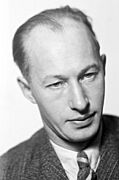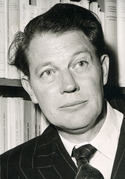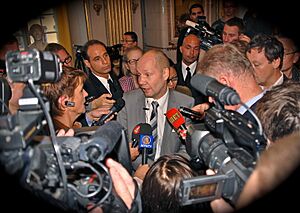Nobel Prize in Literature facts for kids
Quick facts for kids Nobel Prize in Literature |
||||
|---|---|---|---|---|
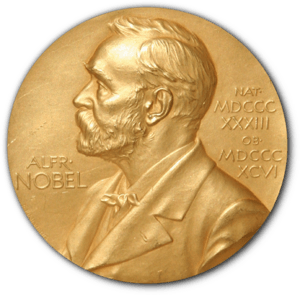 |
||||
| Presented by | Swedish Academy | |||
| Location | Stockholm, Sweden | |||
| Reward | 11 million SEK (2023) | |||
| First awarded | 1901 | |||
| Last awarded | 2025 | |||
| Currently held by | László Krasznahorkai (2025) | |||
|
||||
The Nobel Prize in Literature is a very important award for writers. It is given out every year in Sweden. This prize has been awarded since 1901. It goes to an author from any country. The author must have created the "most outstanding work in an idealistic direction" in literature. These are the words from the will of Alfred Nobel. He was a Swedish inventor and businessman.
The prize is usually given for an author's entire collection of work. It is not just for one book. The Swedish Academy decides who wins this special award. The Academy announced the 2025 winner, László Krasznahorkai, in early October. This prize is one of five Nobel Prizes that Alfred Nobel created in 1895. The Literature prize is often the last one given out at the Nobel Prize ceremony. Sometimes, the award has been announced the following year, like in 2018.
Contents
The Story Behind the Nobel Prize
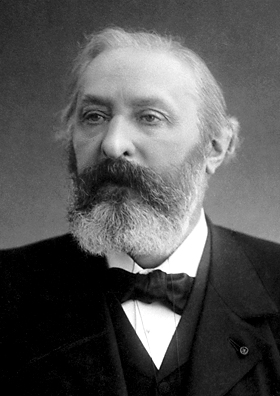

Alfred Nobel was a very smart inventor. He wanted his money to be used for something good after he passed away. In his last will, he said that prizes should be given to people. These people should have done the "greatest benefit on mankind." He wanted prizes in physics, chemistry, peace, medicine, and literature.
Alfred Nobel wrote his final will in 1895. He left most of his money to create these five Nobel Prizes. There were some questions about his will at first. But the Norwegian Parliament approved it in 1897. Two people, Ragnar Sohlman and Rudolf Lilljequist, helped set up the Nobel Foundation. This foundation manages Nobel's money and organizes the prizes.
Soon after, groups were chosen to give out the prizes. The Swedish Academy was chosen to decide the Literature Prize. This was exactly as Alfred Nobel had wished in his will.
How Winners Are Chosen
Each year, the Swedish Academy asks many people to suggest authors for the Nobel Prize. These people include Academy members, literature professors, and past Nobel winners. Authors cannot nominate themselves.
In the early years, there were about 20 to 35 nominations. Now, thousands of requests are sent out. For example, in 2011, about 220 suggestions were sent back. All suggestions must arrive by February 1st.
A special group called the Nobel Committee reviews these names. This committee has four or five members from the Academy. By April, they narrow the list down to about 20 candidates. By May, they choose a final list of five authors.
The committee then spends four months reading the works of these five authors. In October, the Academy members vote. The author with more than half of the votes becomes the Nobel laureate in Literature. An author must be on the shortlist at least twice to win. This means many authors are reviewed over several years.
The Academy members read books in their original language. If a book is in a language no member knows, they get help. Translators and experts provide samples of the writer's work. The Swedish Academy has 18 members who are chosen for life. In 2018, the rules changed. Members can now resign if they wish.
The award is usually announced in October. Sometimes, it has been announced the year after the official year. This happened most recently with the 2018 award. Due to some internal challenges within the Academy, the 2018 winner was announced in 2019. This was done at the same time as the 2019 winner. In some years, like 1949, no one got enough votes. So, the prize was postponed and announced the next year.
What Winners Receive
A Nobel Prize winner in Literature gets a gold medal, a special diploma, and money. The amount of money changes each year. It depends on how much the Nobel Foundation earns. The Literature prize can be shared by two people. If it is shared, the money is split equally.
The prize money has changed over the years. In 2023, it was 11 million SEK. This is about 1 million US dollars. Winners are also invited to give a lecture during "Nobel Week" in Stockholm. The main event is the prize ceremony and a big dinner on December 10th. This prize is one of the richest literary awards in the world.
The Medals
The literature medal shows a picture of Alfred Nobel on the front. It was designed by Erik Lindberg. The back of the medal shows a young man sitting under a laurel tree. He is listening to and writing down a song from a Muse.
The medal has a Latin phrase that means "It is good to have improved life through discovered arts." The winner's name is written on a plate below the figures. The words "ACAD. SUEC." are also on the back. These letters stand for the Swedish Academy.
Since 2012, the medals have been made by Svenska Medalj in Eskilstuna, Sweden.
The Diplomas
Nobel winners receive a diploma directly from the King of Sweden. Each diploma is unique. It is designed by the prize-awarding group just for that winner. The diploma has a picture and text. It states the winner's name and why they received the prize.
Past Winners
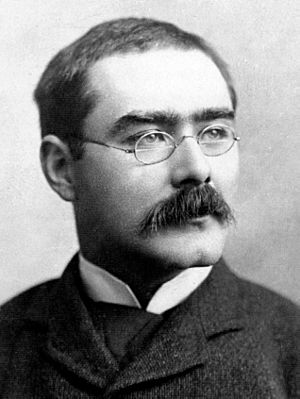
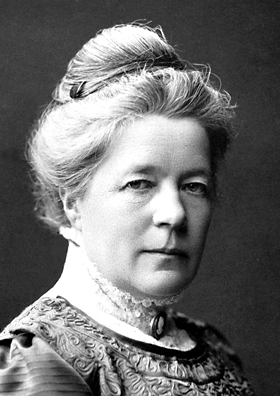
The Nobel Prize in Literature has been given out 116 times between 1901 and 2024. It has been awarded to 121 people. This includes 103 men and 18 women. The prize has been shared by two people four times. It was not awarded in seven different years. Winners have written in 25 different languages.
Rudyard Kipling was the youngest winner. He was 41 years old when he won in 1907. Doris Lessing was the oldest winner. She was 88 when she won in 2007. The prize has been given out after someone passed away only once. This was to Erik Axel Karlfeldt in 1931.
Some members of the Swedish Academy have also won the prize. These include Verner von Heidenstam in 1916 and Pär Lagerkvist in 1951. Eyvind Johnson and Harry Martinson shared the prize in 1974. Selma Lagerlöf became an Academy member in 1914. This was five years after she won the Nobel Prize in 1909.
Three writers have turned down the prize. Erik Axel Karlfeldt declined it in 1919. Boris Pasternak accepted it first in 1958. However, he was later asked by his country's authorities to decline it. Jean-Paul Sartre also declined the prize in 1964.
The Nobel Prize in Literature can be shared by two people. However, the Academy does not often share the prize. They prefer to give it to one person. Shared prizes might seem like a compromise.
The prizes given to Frédéric Mistral and José Echegaray in 1904 were shared. The same happened with Karl Gjellerup and Henrik Pontoppidan in 1917. These were indeed results of compromises. More recently, the Academy has shared the prize only twice. This was for Shmuel Yosef Agnon and Nelly Sachs in 1966. It also happened for Eyvind Johnson and Harry Martinson in 1974.
Honoring Specific Works
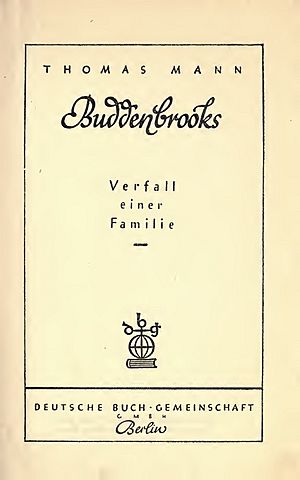
The Nobel Prize in Literature is usually for an author's entire life's work. But sometimes, the Academy mentions a specific book. This book is highlighted for its special quality.
For example, Knut Hamsun won in 1920 for his "monumental work, Growth of the Soil." Thomas Mann won in 1929 mainly for his "great novel, Buddenbrooks." Ernest Hemingway won in 1954 for his "mastery of the art of narrative." This was shown most recently in The Old Man and the Sea.
Learning About Past Nominees
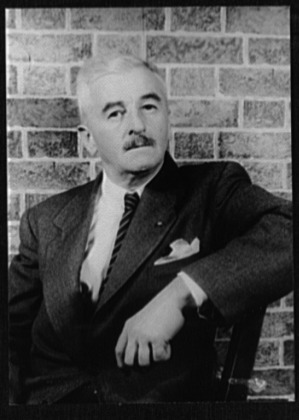
Nominations for the Nobel Prize are kept secret for 50 years. After this time, they become public. You can find them in The Nomination Database for the Nobel Prize in Literature. As of 2025, you can see nominations from 1901 to 1973.
Sometimes, an author wins the prize very quickly. They might win after just one nomination. This happened to Sully Prudhomme in 1901. Other examples include Rabindranath Tagore in 1913 and William Faulkner in 1950.
Former Nobel winners can also nominate candidates. Sometimes, their suggestions have later won the prize. For example, Thomas Mann nominated Hermann Hesse. Hesse later won the prize in 1946.
Media Attention
From the very beginning, the Nobel Prize in Literature got a lot of attention. The first prize in 1901 was reported in many newspapers worldwide. Prizes to authors like Rudyard Kipling in 1907 helped make it famous.
After World War II, the prize became even more well-known. News reports and comments came from all over the world. This made the prize a central part of global literature. Before the announcement each year, people guess who might win. Surprising choices often lead to many discussions in the media.
Other Important Literary Prizes
The Nobel Prize in Literature is not the only award for writers from any country. Other notable international literary prizes exist. These include the Neustadt International Prize for Literature and the International Booker Prize.
The Neustadt Prize is seen as very important. It is often called the American version of the Nobel Prize. Like the Nobel, it honors an author's entire body of work. Many Neustadt winners have later won the Nobel Prize. These include Gabriel García Márquez and Tomas Tranströmer.
The Spanish Princess of Asturias Award in Letters is another important prize. It used to mainly honor Spanish writers. Now, it also awards writers in other languages. Winners of both the Asturias Award and the Nobel Prize include Doris Lessing and Mario Vargas Llosa.
There are also prizes for writers in specific languages. The Miguel de Cervantes Prize is for Spanish writers. The Camões Prize is for Portuguese writers. Octavio Paz and José Saramago have won both these language-specific prizes and the Nobel Prize.
The Hans Christian Andersen Award is sometimes called "the Little Nobel." It honors the lifetime work of writers, but only for children's literature.
See also
 In Spanish: Premio Nobel de Literatura para niños
In Spanish: Premio Nobel de Literatura para niños
- List of Nobel laureates in Literature
- List of Nobel laureates
- List of literary awards
- World literature
 | Sharif Bey |
 | Hale Woodruff |
 | Richmond Barthé |
 | Purvis Young |


